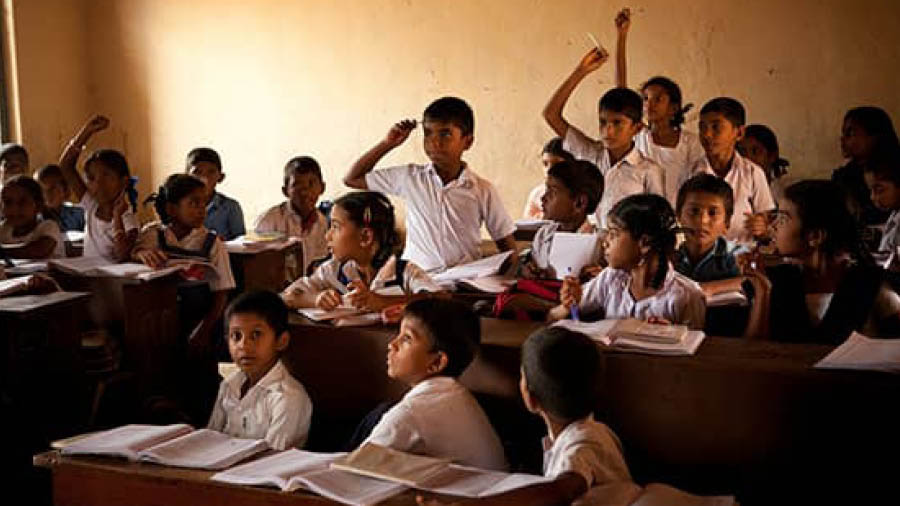Incorporating Vocational Education Into The Core Curriculum At Schools


In today’s job market the importance of vocational skills is undeniable. To foster employment through skill based jobs and entrepreneurship, United Nations Sustainable Development Goals (SDG)-4 focuses on enhancing the skill set of youth and adults by 2030. Likewise even India’s National Education Policy (NEP) 2020 underlines re-imagining vocational education and gradually making it a part of mainstream education. This highlights the significance of vocational skills in education and the job market, which going forward, will require a consolidated effort to incorporate vocational education into the core curriculum in an ideal way.
Growing importance of vocational skills in the job market
In the present scenario, there is a rising demand for vocational skills which makes it paramount for the youth of today to garner and hone their skills and build practical learning capabilities. Employers in the workforce value candidates who have hands-on experience or developed special skills in repair work, culinary, coding, etc. Applying practical knowledge to the job is not only highly valued in today’s time but special skill sets also give an edge to the candidate in the over populated job market. Further, embracing practical applications to your job equips an individual with adaptability and problem-solving skills which is vital in navigating diverse work environments.
Benefits of incorporating vocational education in the core curriculum
Adding vocational classes into the core curriculum offers numerous advantages to student’s learning experience. It helps students gain practical skills and apply the knowledge for real world scenarios and jobs, such as DIY techniques, fixing hand tools etc. Combining vocational classes alongside traditional subjects will make learning for students extremely engaging, relevant and future-ready. I believe, Education institutions that integrate vocational education into their core curriculum, will actually create a future workforce of confident individuals, who will not only have the required skill sets and practical knowledge to deliver their tasks, but it will also help them align their career paths with their interests, strengths and jobs that they are most passionate about.
How to integrate vocational education in the core curriculum
To integrate vocational education into the core curriculum requires a systematic approach. Students can begin by listing down first the most important job skills that are currently in demand in their respective area of work or industry. Locally, then students can approach various business and community groups to showcase the practical application of their skills. This will help students gain experience with real-world context. Weaving vocational applications directly into regular classes, will allow students to apply their knowledge through hands-on projects that mirror real-world scenarios and work on authentic projects. We will need to ensure that teachers are equipped with resources and empowered through training programs to confidently deliver these new lessons with maximum impact. We will need to continually evaluate how well the vocational lessons integrate with the existing curriculum, and make adjustments as necessary to optimize the learning experience for students.
Stigma around vocational education as inferior
The idea that vocational education is a lesser option than college, simply isn't true. Also to believe that it is for people who can't do well academically, is completely wrong. On the contrary vocational education provides students to excel in hands-on learning and prepares for rewarding careers in skilled trades. Skills which are high in demand, like coding, culinary, plumbing, carpentry, automotive repair, problem solving skills can lead to good career options as well. Vocational education is all about celebrating different strengths, which will equip students with valuable, in-demand skills for fulfilling careers. Every student deserves the opportunity to pursue the path that ignites their passion, be it vocational training or college.
Role of schools in embracing vocational education
As per National Education Policy (NEP) 2020 the vocational skills will be incorporated by 2025 in nearly 50% of schools in India. Schools play a big role in accepting vocational education. However, depending on the school’s readiness in terms of a solid curriculum and infrastructure, the specific timeline for schools to fully integrate vocational education can differ from school to school.
Typically the core structure for vocational education in schools as per the NEP 2020 comprises industrial experiences backed with skill-based training, for instance, in Agriculture, a student's journey can start with basics like plant care, knowledge of fertilizers, modern ways of harvesting and techniques like hydroponics. Further the multidisciplinary approach towards teaching, like combining both learnings, the child can build and code to create a simple functional robot that addresses an issue. Teacher Training also forms a core component of the course structure. Teachers have to support the curiosity and exploratory mindset of students so that the students can apply their acquired knowledge to resolve issues and gain experience.
Many schools in India have already started offering vocational and experiential education through multidisciplinary labs, DIY projects, pottery, weaving classes, 3D printing machine assignments, music, dance & theater studios, rock bands, film-making projects, harvesting their own crops in poly-house setup, etc. Vocational education in schools ensures that there is a level playing field, empowering students with the skills that help them thrive in their chosen career path.
The future clearly belongs to those with diverse skills and vocational education will help schools to cultivate these required skills which is pivotal for individuals to navigate and thrive in a dynamic job market. By integrating practical skills with academics, schools can become launchpads for future success. It fosters a sense of purpose and passion in students, which helps them in unlocking their true potential. This inclusive approach tackles the skills gap head-on, bridging the education-to-employment gap. Vocational education will help us create a workforce that is truly prepared for the demands of the modern economy. This translates to a brighter future for both individuals and the economic landscape. Investing in vocational education is truly an investment in the future.
About the Author: Kavita Chatterjee is the Senior VP Academics at the Orchids The International School, Kolkata.